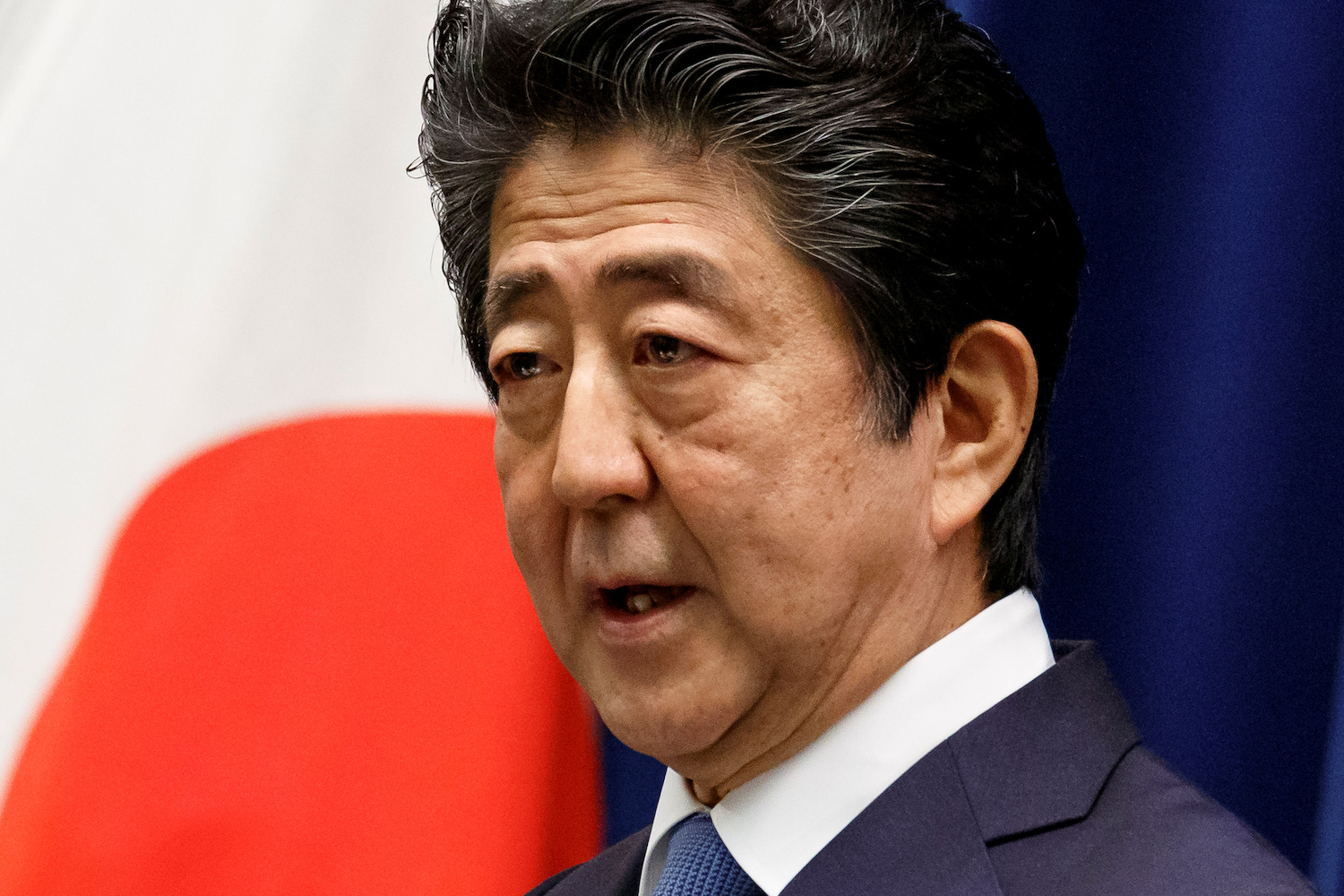News that Japan’s long-running Prime Minister Shinzo Abe will step down hit Tokyo’s stock market hard because of fears of instability and the possibility of changes to the government’s market-friendly policies.
Abe, who will be 66 in three weeks time, confirmed media reports on Friday that he would resign because of a chronic health problem. He told a press conference he was suffering from a recurrence of the ulcerative colitis that ended his first term in office.
Abe said he was receiving a new treatment for the condition that needs to be given on a regular basis but would not leave him with sufficient time to discharge his duties.
“Now that I am not able to fulfil the mandate from the people with confidence, I have decided that I should no longer occupy the position of the prime minister.”
He is expected to stay in office until his ruling Liberal Democratic Party can choose a successor. But there is no consensus yet on who will succeed him. Possible candidates include chief cabinet secretary Yoshihide Suga, Finance Minister Taro Aso and former foreign minister Fumio Kishida, Defence Minister Taro Kono, and former defence minister Shigeru Ishiba. But none of these individuals are known to have strong economic policies or strong economic views.
Today’s news was a bombshell partly because, with no clear successor in place, there is concern on whether the government’s economic and foreign policies will be maintained.
Market-friendly policies
Tai Hui, Chief Asia Market Strategist at JP Morgan Asset Management, said: “The initial market reaction was negative for two reasons: Japan has enjoyed an extended period of political stability under Abe’s leadership. In fact, he just became the longest continuously serving PM this month. There may be concerns that Japan would revert to a political environment with frequent leadership changes. Following Abe’s leadership between September 2006 and September 2007, Japan went through five prime ministers in five years, until Abe took over again in December 2012.
“The second reason is that Abe’s economic policy has been seen as market friendly, especially the Bank of Japan’s ultra-loose monetary policy in asset purchases, including government bonds, corporate debt and ETFs. Not all potential successors of PM Abe are in favour of such aggressive monetary stimulus. That said, the next PM might find it difficult to deviate away from the direction set by Abe.
“The global environment, with the Fed looking to keep policy rates low for an extended period of time, could force the BOJ to remain fairly aggressive. One question is whether the next PM might rely more on fiscal policy. Another aspect worth investors’ attention is how the next PM would fine-tune the economic reform agenda, especially in boosting the country’s productivity amid an unfavourable demographic [ageing] trend.”
Shortly after the news emerged, the Nikkei 225 dropped 2.10%, or 486.99 points, to 22,721.87, reversing earlier gains from the US Federal Reserve’s change in stance in regard to inflation. It later closed 1.41% down.
Yen rises
However, the yen, considered a safe haven in times of uncertainty due to Japan being the world’s biggest creditor nation, rallied against the dollar. Reuters said it leapt about 0.5% to a session-high of 106.10 per dollar on the news before easing to 106.32.
Analysts said the yen jumped on news of Abe’s resignation because the political uncertainty might prompt investors to bring money back home and convert it into yen.
The resignation is a familiar scenario for Abe, who stepped down just one year into his first term, in 2007, over the same health problem. But he was able to return to office in 2012 when the problem was brought under control with the help of new medication.
However, nearly eight years later, his health woes “reappeared” and piled pressure on the PM. But there have also been allegations of corruption and missteps in regard to management of the Covid-19 response.
Despite the relatively contained impact of the coronavirus in Japan, Abe’s government has been heavily criticised for its approach to the crisis, including a U-turn on stimulus payments and a much-mocked decision to issue each household two cloth face masks.
‘Abenomics’ under strain
The prime minister has also seen his signature “Abenomics” economic policy come under increasing strain, with the country already slumping into recession even before the coronavirus crisis hit.
Robert Carnell, regional head of research in the Asia-Pacific for ING Bank, said that “Abenomics” – a policy of massive fiscal, monetary support and economic reforms – “may not have achieved all of its aims, but it wasn’t an unmitigated failure either, and Japan has made some important progress under his leadership. Prior to this, the door to the PM’s office might as well have been a revolving one. PMs came and went quickly, with factions choosing a number of leaders almost on the basis of it being ‘their turn’.”
The level of change to Japan’s economic policies depends to a certain extent on who the next leader will be. Some have suggested that Yoshihide Suga is the most likely, in which case it’s been suggested that there may not be significant change. But other possible candidates have been calling for major changes at the central bank.
Carnell said if Aso or Kishida get the nod as next leader, there could be a clean-out of top personnel at the Bank of Japan. “Both Aso and Kishida have also at times expressed concern over the continuation of the BoJ’s qualitative and quantitative easing policies and negative rates. So although the BoJ Governor is not due to step down until April 2023, there has already been speculation that he may go early. Abe’s resignation and a potentially less supportive new PM might precipitate this, which would open the door for a clean sweep at the top central bank job in Japan and potentially some new policies.“
Jefferies’ senior microstrategy research analyst Shrikant Kale told ATF that while the uncertainty over a new leader and policies lingered, there could be a rise in market volatility. But he believed that concerns about the potential derailing on corporate governance momentum were overblown. “We believe with institutionalisation of higher governance standards, the changes are entrenched in Japan’s new corporate culture and unlikely to unravel. The record high dividends and buybacks are the evidence of the same.
“Moreover, the concerns that in the absence of Abenomics, the foreign selling could expose Japan market to sharp correction too is overdone. It must be noted that the initial euphoria around Abenomics led to strong FII [foreign institutional investment] flows until May 2015, but since then, the foreigners have been consistent net sellers. Of the 21 trillion yen inflows witnessed during Oct 2012 to May 2015, 17.5 trillion has already seen outflows since then. So there is little scope for funds that were essentially parked in Japan to play the ‘Abenomics’ theme to witness further outflows.”
Biggest slump ever
Nonetheless, Japan was hit by its biggest economic slump on record in the second quarter as the coronavirus pandemic emptied shopping malls and crushed demand for cars and other exports, bolstering the case for bolder policy action to prevent a deeper recession.
The third straight quarter of declines knocked the size of real gross domestic product (GDP) to decade-low levels, wiping out the benefits brought by Prime Minister Shinzo Abe’s “Abenomics” stimulus policies deployed in late 2012.
While the economy is emerging from the doldrums after lockdowns were lifted in late May, many analysts expect any rebound in the current quarter to be modest as a renewed rise in infections keep consumers’ purse-strings tight.
“The big decline can be explained by the decrease in consumption and exports,” Takeshi Minami, chief economist at Norinchukin Research Institute, told Reuters. “I expect growth to turn positive in the July-September quarter. But globally, the rebound is sluggish everywhere except for China.”
The world’s third-largest economy shrank an annualised 27.8% in April-June, official data showed on Monday, marking the biggest decline since comparable data became available in 1980 and slightly off a 27.2% fall forecast in a Reuters poll of analysts.
While the contraction was smaller than a 32.9% decrease in the United States, it was much bigger than a 17.8% fall in Japan in the first quarter of 2009, when the Lehman Brothers collapse jolted global financial markets.
The size of Japan’s real GDP shrank to 485 trillion yen, the lowest since April-June 2011, when Japan was still suffering from two decades of deflation and economic stagnation.
Japanese stocks fell on Monday by the most in two weeks and yields on most state bonds fell on the weak GDP data.
Consumption plunges
Underlying Japan’s dismal reading was private consumption, which plunged a record 8.2% as lockdown measures to prevent the spread of the virus kept consumers at home.
External demand – or exports minus imports – shaved a record 3 percentage points off GDP, as overseas shipments tumbled 18.5%, with auto exports hit particularly hard.
Falling global vehicle sales have hurt automakers like Mazda Motor Corp and Nissan Motor Co, among the biggest drivers of Japan’s economy.
Capital expenditure declined 1.5% in the second quarter, less than a forecast 4.2% fall, as solid software investment made up for weak spending in other sectors.
Economy Minister Yasutoshi Nishimura conceded the GDP readings were “pretty severe,” but pointed to some bright spots such as a recent pickup in consumption.
But some analysts warn that companies could cut jobs and spending if a resurgence in infections and soft global demand continue to hurt their bottom line.
Renewed US-China tensions may also weigh on the fragile recovery. About 90% of economists surveyed by Reuters expect the conflict to affect Japan’s economy.
“Demand for business investment is expected to fall due to worsening corporate profits and risk of the coronavirus spreading,” said Saisuke Sakai, senior economist at Mizuho Research institute.
“There is a chance economic activity may stagnate if major nations adopt lockdown measures again, or Japan re-issues a state of emergency,” he said.
Japan has deployed massive fiscal and monetary stimulus to cushion the blow from the pandemic, which hit an economy already reeling from last year’s sales tax hike and the US-China trade war.
While the economy has re-opened after the government lifted state of emergency measures in late May, a recent worrying rise in infections cloud the outlook.
With reporting by Reuters and AFP.
























